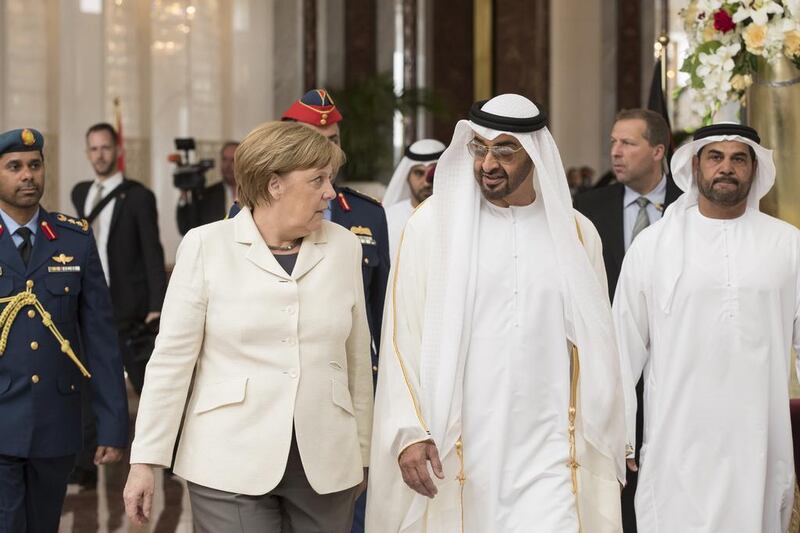ABU DHABI // German chancellor Angela Merkel made a state visit to the UAE on Monday and held talks with Sheikh Mohammed bin Zayed on the conflicts in Yemen, Libya and Syria, as well as strengthening economic ties.
Mrs Merkel was greeted at Abu Dhabi airport by Sheikh Mohammed, Crown Prince of Abu Dhabi and Deputy Supreme Commander of the Armed Forces, followed by an official reception with a 21-gun salute, according to the Wam news agency.
“Mohamed bin Zayed & German Chancellor discuss in Abu Dhabi enhancing strategic bilateral ties, regional & international issues,” Sheikh Mohammed’s Twitter account said.
A business delegation accompanying the German chancellor was expected to hold talks with UAE energy and trade officials in a separate meeting. Reuters reported that Mrs Merkel hopes to rekindle EU-GCC free trade agreement talks that broke down almost a decade ago.
The German leader was in Saudi Arabia for talks on Sunday, and is scheduled to meet Russian president Vladimir Putin on Tuesday.
The UAE is Germany’s largest Arab trading partner, and with economic diversification a priority in Saudi Arabia and in the UAE, finding areas for further investment will also be a priority.
Last year, Sultan bin Saeed Al Mansouri, the Minister of Economy, said the UAE was looking to increase cooperation with Germany’s strong industrial sector as part of diversification efforts that include significant focus on expanding industrial production and expertise.
Under Mrs Merkel, Germany has over the past two years shifted towards a more assertive role in international and security affairs in Europe as well as the Middle East and North Africa.
The UAE is also playing a more assertive military and political role across the region, and Abu Dhabi and Berlin could find increasing areas of mutual interest.
Sheikh Mohammed and Mrs Merkel discussed the Yemen conflict, where European diplomats have been involved in trying to restart political negotiations to bring an end to the war. “Seeking a political solution in Yemen will be high on the agenda” of Mrs Merkel’s Gulf visit, Germany’s ambassador to Yemen, Andreas Kindl, said on Twitter.
In Saudi Arabia, Mrs Merkel urged the parties to find a political solution and said that a worsening of Yemen’s humanitarian crisis must be prevented, according to German media.
In the fight against ISIL, Germany has helped arm and train Kurdish forces fighting the extremist group, and established a UN-administered fund jointly with the UAE to help with reconstruction and governance efforts in territory reclaimed from ISIL.
When the UAE announced last year that it would take in 15,000 Syrian refugees, Germany was one of the countries, along with Canada, that advised Abu Dhabi on resettlement efforts. A statement from the UAE said Monday’s talks would also cover refugee issues.
The Arab conflict closest to western Europe, in Libya, was also on the agenda in Abu Dhabi. Germany and other EU countries are increasingly focused on combating instability in North Africa and also the Horn of Africa, where the UAE is also playing a larger economic and security role.
Germany’s move away from cautious multilateralism has been spurred both by the deep domestic political and security ramifications that the war in Syria and its refugee crisis have had for Europe, as well as the prospect of a more isolationist Washington and aggressive Moscow.
The political upheaval threatening to undermine the EU, partly triggered by the influx of fleeing Syrians, has led senior German officials to believe that the continent’s biggest economy should take on greater global security leadership.
The EU, led by Germany, may also look to move beyond reacting to crises and to try to resolve them with greater political involvement before they spill outside of their borders.
A recent report by the European Council on Foreign Relations urged the EU to “invest in politically focused crisis management” and called for “coordinating closely with other players … to create strong diplomatic frameworks to stop existing conflicts spreading and potential crises spinning out of control”.
An early test of this approach may be Yemen, where European officials fear that an escalation in fighting between the Saudi-led coalition and Iran-backed rebels may exacerbate the dire humanitarian situation.
tkhan@thenational.ae






